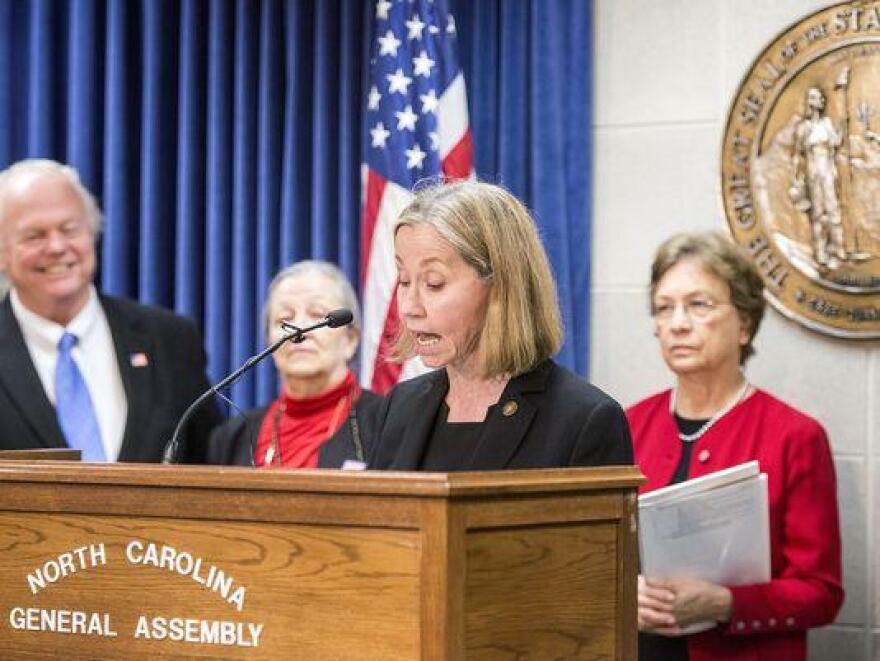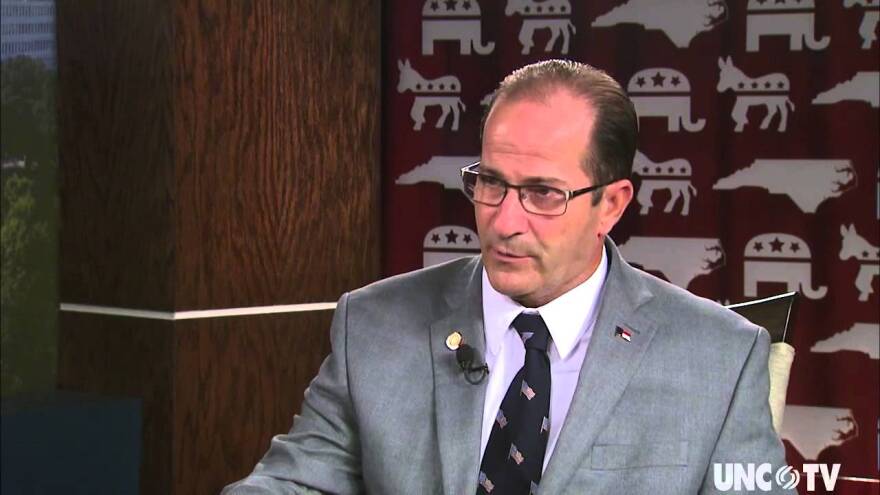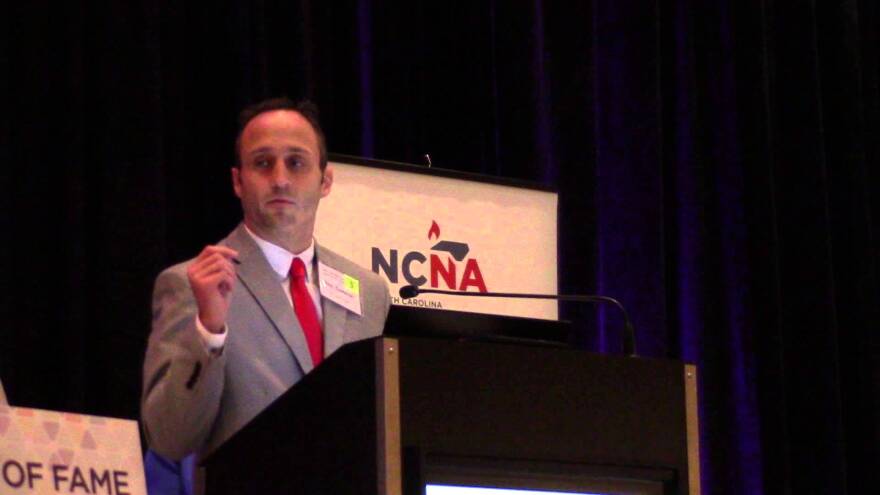Political observers and the public alike were scratching their heads after a bill that would impose districts on the city of Asheville for city council elections failed. The bill was being pushed by a powerful state lawmaker and had sailed through two committees and the full Senate with little but Democratic resistance. And then, on its last stop in the full House, all of that changed. Debate seemed to persuade lawmakers at the last minute, and that is something rarely seen in politics today. But in truth, there were probably multiple factors at play, and they had occurred not just over the two weeks since the bill emerged, but over several years. This 9-point analysis is my attempt to parse what happened.
1. The local delegation set the stage.
There is no question that at the House session, the three House members representing Buncombe County (Democrats Susan Fisher, John Ager, and Brian Turner) came prepared. Each had an amendment to offer, and it appeared that the rollout of those amendments was carefully choreographed in advance. At one point, Turner was called to offer an amendment and he declined, saying Ager was next in the cue. Each amendment failed, and Fisher seemed to have prepared remarks if that occurred. Her 5-minute address to the House, in which she forcefully took on the bill and bill sponsor Republican Senator Tom Apodaca, seemed to mark a shift in the debate.
After that address, Republicans became the loudest critics of the bill. Those members who bucked their own party leadership were instrumental in the bill’s defeat, but the local delegation spoke calmly, patiently, and forcefully throughout the entire hour and 20 minutes of debate.
2. Rep. John Blust’s remarks might have been the nail in the coffin.

Several Republicans spoke out against the bill, notably Josh Dobson, who represents three western North Carolina counties, and Michael Speciale of New Bern. But it was the fiery and impassioned 5 minute address by Rep. John Blust of Greensboro that stole the show. Blust went after Republicans in a very personal way, basically calling them out for cowardice. He implied they were going along with the bill because Apodaca was holding up House legislation in the Senate unless he got his way with the Asheville bill. Colin Campbell, a reporter with the News & Observer of Raleigh, tweeted out shortly before the debate that the Asheville district bill seemed to be a pawn in negotiations between the House and Senate. Speaker Tim Moore even said before the debate that there was legislation being help up and as a result, they would not vote on certain measures. Blust also seemed to be incensed that the bill was being introduced as an elections bill, rather than a local bill, which would have been ineligible. The Asheville Citizen-Times has an analysis of that portion of the debate. But it was Blust’s tone that stood out. He was even asked by the speaker to “keep the volume down” in his remarks. There’s a backstory here, and one I am not entirely aware of, but Blust said that he “couldn’t get ahead” in politics. What I do know is that Blust ran for Congress in the June 7th primary in the newly drawn 13th district. If you’ll remember, that was the extraordinary race in which 17 Republicans ran. Blust came in 2nd to Ted Budd, a gun-shop owner who was the recipient of $500,000 from the conservative Club for Growth. Whether he was referring to that race or not, Blust was unquestionably a factor in SB897’s defeat. Listen below.
3. The build-up to the final session mattered and Democratic resistance was unwavering.

SB897 got through two committees and the full Senate before any Republicans spoke against it. Senator Terry Van Duyn of Buncombe County led that opposition. Local delegates were offended that they were shown the bill only after maps had been drawn. They were given 48 hours to offer recommendations. After those recommendations were ignored, Democrats were incensed. Listen to Van Duyn’s remarks before the full Senate.
Other Democrats spoke out as well, notably Senator Floyd McKissick of Durham.

I reached him at his Durham business office after learning it would be coming before the committee on redistricting, of which he is a member. He had not yet seen the bill, but had experience with other redistricting efforts from the General Assembly in Greensboro and Wake and Buncombe Counties. He would tell me that there was a tactic in recent years to rush bills like this through with little public input because "they've thought about it, reflected upon it, and have decided they know better."
McKissick would question the bill in committee, which preceded an incredible exchange on the full Senate floor in which Sen. Jerry Tillman suggested he should not have the right to even speak on the bill.
Still, resistance up to that point had still only come from Democrats. But it is clear that some Republicans changed their minds.

Listen to Rep. Michael Speciale in a committee meeting here. Remember that Speciale would become one of the most forceful critics of the bill on the House floor.
Here was Speciale speaking on the full House floor after Brian Turner offered an amendment to allow independent redistricting. To that point, each amendment had failed and members were arguing against passing this one.
The amendment would go on to fail, but Speciale would speak a second time as the last speaker of the debate to forcefully call for the bill to be voted down.
So something changed. This next bit is my best guess what that was.
4. Bi-partisan relationships across the aisle mattered.

I’ve noted that Josh Dobson was one of the Republicans to speak out against the bill. Let me take you back to two series of interviews I conducted with area lawmakers I titled “In Their Words” and “Legislative Wrap.” In interviews with Dobson and Brian Turner, each brought up their work across the aisle. Here’s a discussion with Turner on the matter:
And here was Dobson talking about his working relationship with Turner and Fisher.
In people’s reaction to the results on the Asheville bill, many expressed astonishment that Republicans and Democrats agreed on something. Many people have grown cynical about politics in general. And while that’s understandable, Friday night was a bright spot for some. Rep. Ager said his faith in the process was restored.
5. Tensions between Asheville and Hendersonville lawmakers remain.

Since we are looking at that past series of interviews, I want to point out one I did with Republican Chuck McGrady of Hendersonville. First, listen to what he had to say about the Asheville districts bill on the House floor.
This interview I did with McGrady came shortly after more legal movement on the Asheville water system.
McGrady expresses a frustration with Asheville that’s years in the making and seemed to influence his vote on the districts bill. Apodaca, who is also from Hendersonville, is accused by Democrats of taking a “parting shot” at Asheville in the districts bill, as he is now retiring. For his part, Apodaca says he only wants to give his south Asheville constituents a chance to have a seat on council, but there is no question that there is resentment between lawmakers of the two cities.
6. The House asserted itself.
As already alluded to in the section over Rep. Blust, tensions between the House and Senate were starting to boil over. WRAL’s capitol reporters Laura Leslie and Mark Binker had a great take on that tension on the final day of session in their daily wrap video from the legislature.
This tension was years in the making. If you’ll recall in the previous budget debate that lasted months longer than anticipated, the Senate crammed a number of policy issues into their version of the budget, which was much more austere than the House version. That played out again in recent weeks over this recent budget debate. The overall perception is that the Senate is more conservative than the House, and less compromising. You can literally hear the frustration from House members during the Asheville districts bill debate.
7. The rushed nature of the bill almost worked, but ended up contributing to its downfall
This bill failed around 6pm on the day that the Senate and House each adjourned the short session, meaning it was one of the last points of debate. It even overshadowed in some way the long-anticipated debate over House Bill 2. That Senator Apodaca wanted to push the bill at the last minute could be explained in several ways. One, he is retiring, so this is his last chance to make the impact on Asheville he wanted to (though it has been noted that Apodaca has mentioned possibly becoming a lobbyist after his retirement, so the bill could emerge again). It could also be argued the bill was rushed because of its controversial nature, and as Sen. McKissick noted in our conversation, done so to offer as little public input as possible. But in the end, House members seemed to resent being forced into the debate at the last minute. And as the clock ran out on session on the last day, the rushed nature proved to spell doom for the bill, at least for now.
8. Last-minute court decisions may have played a role
While the legislature hasn't shied away from court battles in recent years, the timing of a decision by the 4th Circuit Court of Appeals may have been a factor, if not a deciding one in the bill's defeat. The court ruled maps drawn by Republicans for Wake County commissioners and school board members were unconstitutional. The ruling came down just hours before lawmakers were set to debate the Asheville districting effort. Meanwhile another federal court has stayed for now the maps drawn for Greensboro city council. Those rulings came up during the House debate, and Rep. Ager said it was likely Asheville would file a lawsuit if SB897 was passed.
9.Apodaca didn’t help

Whether it was the disputed way in which he introduced the bill over the wishes of the entire Asheville City Council and local delegation, his signature on a form declaring the bill had support and was non-controversial (which he would withdraw as an error), his refusal to allow for a referendum for the voters, or to allow any recommendation for the other lawmakers from Buncombe, Apodaca fed into the impression that he had the attitude that he, and he alone, knew what was best for the city. The local delegation didn’t take kindly to it. Having no luck reaching him myself, I asked WUNC reporter Jorge Valencia, who reports from Raleigh, to try and get a comment from Apodaca at one of the committee meetings.
Apodaca continued to feed the impression that he was doing this on his own and didn’t care what anyone thought. That was not unique to the Asheville bill. Throughout his career Apodaca was said to be cordial and likeable amongst his colleagues, but was also said to wield his power like a sledgehammer. The frustration among House members seemed to reach a breaking point, especially as it was suggested House legislation was being held up over the Asheville bill. In the end, Apodaca may have done his bill more harm than good, despite having a clear majority of Republicans to pass the bill in a different manner.






